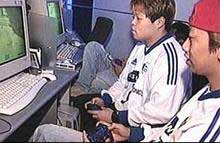A New Class of “Entrepreneurs” Collecting Virtual Items in Games and Selling Them for Real Money: Is It Fair in a Game?
 On October 18, K. sat in front of the computer screen for 12 to 15 hours straight, playing online games to… make a living. K. is a high-level item collector in a virtual world that attracts more than 200,000 real players. The game K. is addicted to is Lineage, a medieval-themed game. K. plays with seven characters (accounts) simultaneously on four computers, aiming to find virtual items, such as a magical sword that can help the character level up quickly. Having graduated from a relatively unknown university in South Korea, at the age of 27, K. has yet to secure a job. K. has turned to a “gray” profession, earning about $4,000 a month by selling virtual items to other gamers.
On October 18, K. sat in front of the computer screen for 12 to 15 hours straight, playing online games to… make a living. K. is a high-level item collector in a virtual world that attracts more than 200,000 real players. The game K. is addicted to is Lineage, a medieval-themed game. K. plays with seven characters (accounts) simultaneously on four computers, aiming to find virtual items, such as a magical sword that can help the character level up quickly. Having graduated from a relatively unknown university in South Korea, at the age of 27, K. has yet to secure a job. K. has turned to a “gray” profession, earning about $4,000 a month by selling virtual items to other gamers.
Even among the global gaming community, there remains a lack of consensus regarding the trading of virtual items. Players pay to gain advantages (a magical weapon or a defensive item), and many believe it to be cheating or foolish. According to their reasoning, ordinary people only spend real money on things that are genuinely valuable. “Buying and selling virtual items in games is really a crazy idea,” stated Kim Min Ho, a student, “I don’t understand why people do it when there are so many other ways to spend money“.
In the view of others, this is merely a form of “capitalistic profit-making” in their work. Kim Ki Woon, a 27-year-old office worker, believes that “it’s great to make real money while indulging in your hobby“.
In South Korea, trading virtual items is not considered illegal. However, this activity goes against the regulations of most game service providers, including Lineage. Some game developers encourage the exchange of virtual items among friends, and some even sell virtual items for real money. Nonetheless, no company openly supports the practice of gamers like K. making a living in the virtual world. How the South Korean courts or government will rule on disputes stemming from the virtual world remains unclear. This is also why K. is hesitant to reveal their identity.
South Korea is regarded as a leading “networked” country, establishing itself as a global hub for online gaming. In 2001, the South Korean government collaborated with Ncsoft, the producer of Lineage, to find solutions to disputes related to virtual items. It is known that Ncsoft has banned over 200,000 gamers involved in this activity; however, the “market” for trading virtual items continues to operate underground but is highly active. According to incomplete statistics, there are about 200 companies acting as intermediaries in the virtual item trading market, with total revenues ranging from $83 million to $415 million per month. The largest company, ItemBay, has 1.5 million customers and monthly revenues of approximately $17 million. Dismissing the notion that trading virtual items is illegal, ItemBay’s director Chung Sang-Won stated: “This action is not illegal, and ItemBay is not doing anything wrong. The company merely provides a service that customers need“.
Countries around the world are still striving to find their way through the “maze” of rights related to online property. However, the general trend is leaning towards allowing game producers to manage the virtual worlds they create. According to Whang Sang-min, a gaming expert at Yonsei University (Seoul, South Korea): “The online gaming world is gradually mirroring the real world, and each economy is accepting the virtual world in its own way“. In China, courts have ruled that players who invest time deserve to enjoy the “loot” earned in the game. Similarly, online gaming companies in South Korea began introducing virtual currency in 1998, paving the way for the exchange of real money for virtual currency. Immediately, everything in the game was assigned a value, and players had to grasp the concept of online property rights. Recently, the Online Consumers Union (OCU) sued Ncsoft, demanding that the company provide compensation for damages (for example, for a sudden power outage causing virtual property loss…)
Another simulation of the real world. South Korea is investigating rumors that criminal organizations operate speculative networks for online “goods.” Professor Ian MacInnes from Syracuse University predicts that as virtual currency spreads, game producers will need to hire economic experts to control inflation, speculation, and exchange rates between virtual markets—甚至 between virtual markets and real markets. According to MacInnes, the decision of whether “virtual money” or “real money” is good or bad depends on individual perspectives.


















































